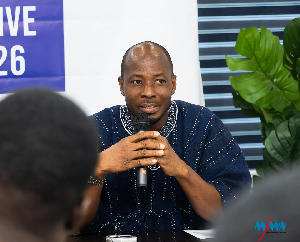The Integrated Social Development Centre (ISODEC), an advocacy organisation, has observed that the absence of transparent and participatory examination of International Monetary Fund (IMF) programmes and conditionalities by the broad spectrum of social partners before their adoption by governments is creating serious political, social and economic consequence.
This has led to disillusionment and understandable charges of failure by the IMF in several countries, says ISODEC.
These observations were contained in an overview statement presented at a one-day national forum in Accra last Thursday on the role of the IMF in Ghana's development process. The forum forms part of a series of lectures under ISODEC's general advocacy programs to generate debate on issues confronting the nation.
The forum discussed topics like "HIPC, conditionalities and Ghana's Development Options"; "The Social and Economic Consequences of current Austerity Measures"; and "Ghana Poverty Reduction Strategy Program: A conditionality or a development strategy?"
ISODEC noted that the IMF and the World Bank have been deeply involved in formulating public policies in Ghana within the past two decades, and the processes, mechanisms and impacts of this involvement in overall national economic development remain subjects of intense debate and concern.
The advocacy group pointed out that the introduction of Ghana/IMF/World Bank Poverty Reduction Strategy Programme (PRSP) and the Poverty Reduction Growth Facility (PRGF) respectively, and Ghana's decision to access the Highly Indebted Poor Country (HIPC) package has taken the country's economic policy engagement with external development partners to even greater limits and dimensions.
"Several anxieties and questions agitate the minds of many social partners who are not privileged to be part of the design, adoption and implementation of these programs but often are burdened with the greatest incidence of their impacts", noted ISODEC.
It said the practice of imposing conditionalities infringe on a borrowing country's sovereignty and shrink the democratic arena or political space within which citizens can operate. The targets can even be politically difficult to meet if they create social destabilization, it added.
In her intervention, Zo Randriamaro said of the Third World Network, an advocacy organisation, also observed that austerity measures always impact more heavily on women. She said such fiscal and monetary policies create credit squeeze and higher cost of inputs, especially production costs.
Zo noted that these negative developments lower income of the vulnerable groups in the society, which, invariably, affects men's contribution towards the upkeep of their families.
"The net result is that the responsibility of child care is passed on to women who are forced to increase their working hours to compensate for their spouse's loss revenue", she said.
The forum, which generated lively discussions and contributions from participants, provided a platform for the public articulate their concerns on IMF and World Bank policies in Ghana.
General News of Monday, 27 August 2001
Source: Public Agenda












